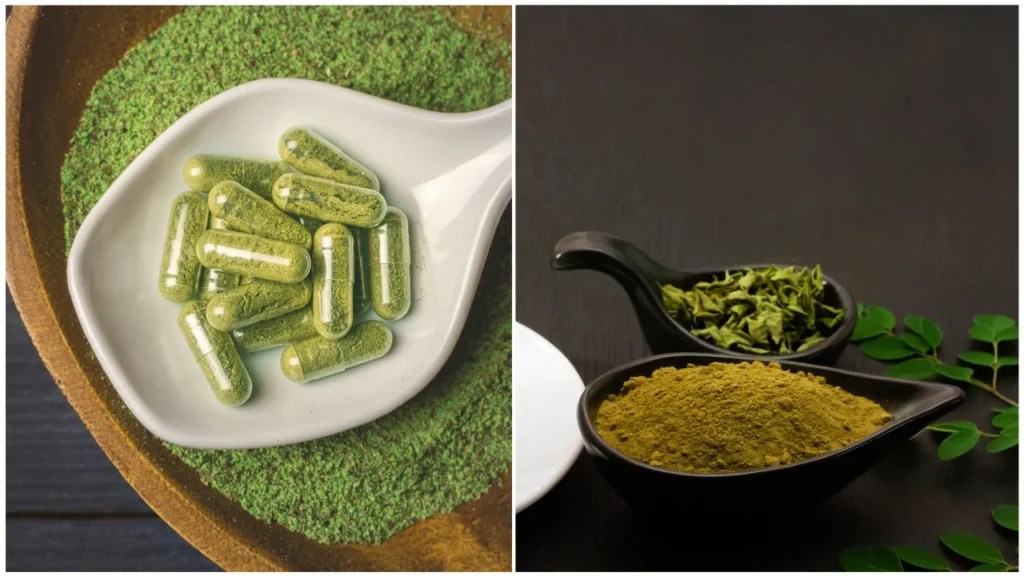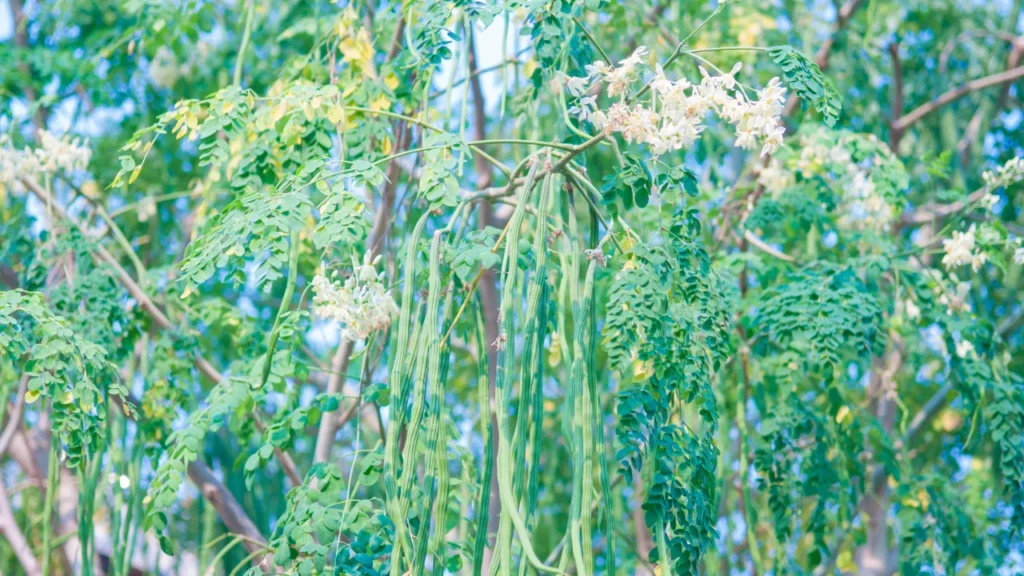Moringa is a plant famous for its numerous health benefits and various applications. Also known as Moringa oleifera, it is a plant native to Africa and Asia. Its ability to grow very rapidly, resilience to pests and drought, and nutritional characteristics have made it a key player in the fight against malnutrition, earning it a treasured place in both traditional and modern health practices around the world.
You May Also Like:
Moringa: Proper Dosing and Consumption of this Superfood
Moringa: Benefits, Dosage, Side Effects, Drug Interactions, and Other Important Information
Origins and Historical Significance of Moringa
The moringa tree has a long history dating back to approximately 2000 BCE in the Indian subcontinent. Its use and cultivation are documented in ancient writings like the Vedas, where its medicinal qualities were highly esteemed. Although the tree’s natural distribution is found in the foothills of the Himalayas in Northwestern India, Pakistan, Bangladesh, and Afghanistan, its adaptability has caused it to spread throughout tropical and subtropical areas of the world.
Since ancient times, people have realized that this plant could help heal conditions including anemia, asthma, and digestive issues. It has been utilized in traditional medicine for almost 4,000 years. Its many uses were first highlighted by the ancient Greeks, Egyptians, and Romans who extracted edible oil from the seeds and utilized it for skin protection and scent.
Moringa oleifera has a rich and varied historical significance that spans nutrition, medicinal, and even practical uses. Because of the moringa tree’s many health benefits, ancient cultures used it in their everyday rituals and healing arts. Moringa is highly valued in traditional healthcare practices since it is believed to prevent over 300 ailments in Ayurvedic medicine.
In ancient communities, moringa was significant economically and socially in addition to its medical properties. Its seeds yield an oil called Ben oil, which is useful for cooking and cosmetics. It is transparent, sweet, and odorless, with a nutritional profile similar to that of olive oil. The ancient Egyptians used this oil to make perfumes and to shield their skin from the abrasive desert environment.
The moringa tree has become essential to local economies and cultures in areas like South Asia and Africa where it grows naturally. As an example of zero waste, every portion of the tree was utilized. The pods were used as vegetables, the leaves provided nourishment, the seeds filtered water, and the bark and roots were processed into powders and extracts for traditional medicinal uses. The fact that Moringa oleifera is now found outside of its original habitat is evidence of its adaptability and effectiveness.
The nutritional and therapeutic benefits of moringa have become well-acknowledged by the early 21st century. The use of moringa has become more common as evidence from contemporary science has begun to confirm the millennia-old knowledge held by ancient cultures. Moringa oleifera is not just a plant of the past, it is also a key to the future due to its application in modern medicine, dietary supplements, and as a sustainable solution to malnutrition and environmental degradation.

Health Benefits of Moringa oleifera
Moringa oleifera is not only a nutritional powerhouse but also a source of significant health benefits. Its leaves, seeds, and even roots contain compounds that have been linked to a reduction in inflammation, improved blood sugar control, cancer prevention, liver protection, enhanced digestion, better brain health, and heart health support. Here’s how Moringa oleifera contributes to these aspects of health:
Moringa Reduces Inflammation
Numerous health problems, including cancer, autoimmune illnesses, and heart disease, are linked to chronic inflammation. Strong anti-inflammatory substances like isothiocyanates are found in moringa. According to studies, these substances can potentially provide relief from and defense against chronic illnesses by reducing the body’s inflammatory enzymes and proteins, which in turn can considerably reduce inflammation.
Moringa Aids in Blood Sugar Control
To avoid diabetes and preserve general health, blood sugar regulation is essential. Substances such as isothiocyanates found in the plant have been shown to have antidiabetic potential. Studies show that eating powdered moringa leaf can assist people with diabetes or those at risk for the disease reduce their fasting blood sugar levels.
Help in Cancer Prevention
The fight against cancer is ongoing, and Moringa oleifera may play an important part because of its high antioxidant content and substances such as niazimicin, which studies suggest may suppress cancer cell proliferation. While research is still in its early stages, moringa’s potential for cancer prevention is encouraging, emphasizing its importance in a health-conscious diet.
Moringa Offers Protective Effects Against Liver Damage
The liver is essential for detoxification, fat metabolism, and nutrient processing. Moringa oleifera‘s high concentration of polyphenols can help protect the liver against damage, oxidation, and fibrosis. This protective effect supports liver function and can enhance the liver’s ability to repair itself, indicating moringa’s potential as a liver-friendly supplement.
Moringa Enhances Digestive Health
The benefits of Moringa oleifera extend to digestive health. Fiber from its leaves helps to keep the digestive tract healthy by avoiding constipation and promoting a healthy balance of gut flora. To emphasize the benefits of moringa for digestive health, traditional medicine has been utilizing this plant to treat liver illness and stomach ulcers.
Improve Cognitive Function
The antioxidant qualities of moringa are advantageous for both mental and physical well-being. Because moringa has high quantities of vitamins C and E, it can protect the brain from oxidative stress, which can cause neuron degeneration. Furthermore, it might improve mood, cognition, and brain activity, indicating that moringa might be useful in preventing neurodegenerative illnesses and age-related cognitive decline.
Moringa Supports Heart Health
Heart disease remains a leading cause of death worldwide, and Moringa oleifera offers several benefits in the fight against cardiovascular disease. Its antioxidant properties can help lower cholesterol levels, while its anti-inflammatory effects can reduce blood pressure and prevent plaque formation in the arteries. By supporting healthy heart function, moringa can be a valuable component of a heart-healthy lifestyle.
The myriad health benefits of Moringa oleifera, from reducing inflammation and controlling blood sugar to supporting liver function, digestion, brain health, and heart health, underscore its potential as a therapeutic supplement. While further research is needed to fully understand and harness its health-promoting properties, incorporating moringa into one’s diet can contribute to overall well-being and disease prevention.

Moringa in Traditional Medicine and Scientific Research
Moringa oleifera has long been valued in traditional medical systems all around the world. Its extensive application in African, indigenous, and Ayurvedic medicine speaks much about its medicinal potential. Scientific research has recently started to catch up with traditional knowledge, and thorough studies have validated many of the health advantages linked to moringa. This thorough investigation explores the use of moringa in traditional medicine and also recent findings in the scientific community.
Moringa’s Place in Traditional Medicine
In traditional medicine systems, nearly every part of the moringa tree is used for health purposes. Its leaves, seeds, roots, and bark are incorporated into treatments for a wide range of ailments:
- Ayurvedic Medicine: In Ayurveda, moringa is esteemed for its anti-inflammatory, antifungal, antiviral, antidepressant, and antipyretic properties. It has been used to treat liver disease, diabetes, eye disorders, blood impurities, and digestive issues among many other conditions. Ayurvedic texts recommend moringa for over 300 diseases, highlighting its versatility as a medicinal plant.
- African Traditional Medicine: In many parts of Africa, moringa is a key ingredient in folk remedies. It is used to combat malnutrition, especially among infants and nursing mothers, due to its high nutrient content. Traditional healers also use it to treat infections, reduce high blood pressure, and enhance milk production in lactating women.
- Other Traditional Practices: Across Asia and Latin America, moringa’s use in traditional medicine is similarly diverse. It has been employed to treat everything from minor wounds and headaches to more severe conditions like malaria and typhoid fever.
Scientific Research on Moringa
The surge in scientific interest in Moringa oleifera can be attributed to its rich nutritional profile and potent phytochemical constituents. Research has focused on various aspects of moringa, including its antioxidant, anti-inflammatory, antimicrobial, and antidiabetic properties. Here are some key findings from scientific studies:
- Nutritional Benefits: Scientific analyses have confirmed that moringa leaves are rich in vitamins A, C, and E, calcium, potassium, and proteins. These nutrients are crucial for maintaining immune function, bone health, and preventing oxidative stress.
- Antioxidant Activity: Studies have found that moringa contains several powerful antioxidants, such as quercetin and chlorogenic acid. These compounds can help lower blood pressure, reduce blood sugar levels, and mitigate oxidative stress, potentially reducing the risk of chronic diseases like diabetes and heart disease.
- Anti-inflammatory Effects: The isothiocyanates in moringa are shown to have significant anti-inflammatory effects. Research suggests that these compounds may help reduce inflammation in cells, offering therapeutic potential for conditions associated with chronic inflammation, such as arthritis and heart disease.
- Antimicrobial Properties: Extracts from moringa leaves, seeds, and roots have demonstrated antimicrobial activity against a range of pathogens, including bacteria, fungi, and viruses. This supports the traditional uses of moringa in treating infections and underscores its potential as a source of new antimicrobial agents.
- Cancer Research: Preliminary studies have explored moringa’s potential in cancer therapy. Certain phytochemicals in moringa, such as niazimicin, have been found to inhibit the growth of cancer cells. While research is in its early stages, these findings are promising for the development of plant-based cancer treatments.
Bridging Tradition and Science
The convergence of scientific research on Moringa oleifera and traditional medicine underscores the increasing acknowledgment of the plant’s medicinal benefits. Researchers can further validate and improve the usage of moringa in contemporary medicine by comprehending the mechanisms underlying its health advantages. The transition of moringa from traditional medicine to scientific study highlights the plant’s enormous potential for health benefits.

Nutritional Powerhouse of Moringa
With a rich spectrum of vitamins, minerals, and other vital components, Moringa oleifera is a nutritional powerhouse that outperforms many conventional foods. In particular, the leaves are incredibly high in vitamins A, C, and E, which are essential for immune system support, eye health maintenance, and skin protection against oxidative damage. Moringa leaves are rich in calcium for strong bones, potassium for heart health, and protein for muscle growth and repair in addition to these vitamins.
The view on its nutritional density is provided by the comparison with common foods. For instance, moringa contains more vitamin A than carrots, ensuring strong vision and immune system function. Moringa also contains more calcium than milk, more iron than spinach, and more vitamin C than oranges. Because of its exceptional nutritional profile, moringa is a superfood that is widely used in diets around the world as a supplement.
Environmental Impact of Moringa
Its rapid growth and resilience make it an ideal candidate for reforestation efforts, particularly in arid regions where soil degradation and deforestation are prevalent issues. Moringa has the ability to grow in poor soil with minimal water requirements. This reduces the need for chemical fertilizers and intensive irrigation, thereby conserving water resources and promoting soil health. Furthermore, the tree plays a crucial role in purifying water. Moringa seeds contain a coagulating agent that can bind to impurities, making it an invaluable resource for communities lacking access to clean water. The extensive root system of the moringa tree helps in preventing soil erosion, a critical aspect in maintaining fertile land for agriculture and safeguarding natural habitats. Additionally, moringa contributes to carbon sequestration by absorbing carbon dioxide from the atmosphere, thus mitigating the effects of climate change. Through these environmental benefits, Moringa oleifera not only supports ecosystems but also offers sustainable solutions for agricultural and nutritional needs, marking its significance beyond health and wellness into the realm of environmental conservation.
Moringa’s Uses in Beauty and Health Products
Moringa can also be used to harness products designed to enhance wellness and beauty. Here’s a detailed exploration of its uses in beauty and health products, including a focus on combating hair fall with moringa.
Moringa Oil in Skin Care
Moringa oil, extracted from the seeds of the moringa tree, is a cornerstone in skincare formulations. Rich in behenic acid, it is deeply moisturizing and is known for its ability to impart a healthy glow to the skin. This oil is non-comedogenic, which means it moisturizes without clogging pores, making it suitable for all skin types, including oily and acne-prone skin. Its high antioxidant content also helps fight skin aging by neutralizing free radicals and protecting the skin from environmental stressors. Moringa oil is found in a variety of products, from face creams and serums to body oils and lip balms.
Moringa Leaves in Health Supplements
The leaves of Moringa oleifera are dried and powdered to create a nutrient-rich supplement. Moringa leaf powder supplements can boost overall health, support immune function, improve digestion, and enhance energy levels. They are also used in detox teas and green powders, promoting wellness and vitality.
Moringa for Hair Care
Moringa’s benefits extend to hair care, where it is used to nourish the scalp, strengthen the hair, and prevent hair fall. The high content of vitamins and minerals in moringa leaves and oil makes them excellent for hair health. Moringa oil is particularly beneficial for hair, as it moisturizes the scalp, combats dandruff, and strengthens hair follicles.
Combating Hair Fall with Moringa
Hair fall can be caused by a variety of factors, including nutritional deficiencies, stress, hormonal imbalances, and environmental damage. Moringa, with its rich nutrient profile, addresses several of these issues, supporting hair health and reducing hair fall.
- Moringa Oil Scalp Massage: Regularly massage your scalp with moringa oil. This stimulates blood circulation to the scalp, strengthens hair follicles, and promotes hair growth. Moringa oil’s rich supply of zinc is crucial for keratin production, a protein essential for strong hair.
- Moringa Leaf Powder Hair Mask: Create a hair mask by mixing moringa leaf powder with water to form a paste. Apply this to your scalp and hair, leaving it on for about 20 minutes before washing off with a gentle shampoo. This mask can nourish the scalp, reduce dandruff, and prevent hair breakage.
- Incorporate Moringa Powder into Your Diet: Consuming moringa leaf powder as a dietary supplement can also contribute to hair health from the inside out. The iron, vitamins, and essential amino acids in moringa support hair growth and help prevent hair fall.
- Moringa-infused Hair Products: Look for shampoos, conditioners, and hair treatments that contain moringa extracts. These products can help reinforce hair strength, improve scalp health, and reduce hair fall over time.
Moringa oleifera’s multifaceted applications in beauty and health products underline its incredible versatility and efficacy. By integrating moringa into both topical treatments and dietary routines, individuals can harness the full spectrum of its health and beauty advantages, paving the way for stronger, healthier hair and a vibrant, youthful complexion.

Moringa’s Role in Fighting Global Malnutrition
Moringa can be used to fight hunger throughout the world. Let’s look into its role in addressing malnutrition. Malnutrition is a state of the body with a significant lack of nutrition. This can include stunting (low height for age), wasting (low weight for height), underweight (low weight for age), and micronutrient deficiencies, as well as overweight and obesity. Moringa’s high nutrient content directly addresses the micronutrient deficiencies that are a critical component of undernutrition.
- Supplementing Diets: In many developing countries, moringa is being introduced into diets to supplement essential nutrients. Its leaves can be dried and powdered, making it easy to store and transport, and added to meals to enhance their nutritional value without significantly altering the taste.
- Infant and Maternal Health: Moringa has been identified as a valuable nutritional supplement for pregnant and lactating women, given its high iron, calcium, and vitamin content. These nutrients are crucial for the health of both mothers and their babies. Incorporating moringa into the diets of nursing mothers can also help increase milk production, further supporting infant nutrition.
- School Feeding Programs: Recognizing its potential to improve nutrition and cognitive function, some regions have incorporated moringa into school feeding programs. By enriching school meals with moringa powder, these programs aim to combat malnutrition and improve learning outcomes among school-aged children.
- Agricultural Practices: Moringa’s resilience and rapid growth make it an ideal crop for areas with poor soil quality and limited water resources. Its cultivation can be a sustainable agricultural practice, providing communities with a readily available source of nutrition and potentially creating economic opportunities.
Organizations worldwide are researching the best methods for cultivating, processing, and incorporating moringa into diets, especially in malnutrition-prone areas. Non-governmental organizations (NGOs), government bodies, and international agencies are working together to raise awareness about moringa’s benefits, train farmers in its cultivation, and develop supply chains to make moringa products accessible to vulnerable populations.
Even while moringa offers a promising treatment for malnutrition, there are still a number of difficulties. These include the need for greater study on the ideal levels of consumption and methods, the acceptance of moringa as a food source in various cultures, and the variety in nutrient content resulting from varying growing conditions. Despite these difficulties, moringa presents a number of important opportunities to enhance world nutrition.

Conclusion
In summary, Moringa, scientifically known as Moringa oleifera, is recognized as a superfood with a balanced nutritional profile. This makes it a promising remedy for malnutrition. This plant is not only famous for its nutritional profile but also its adaptability to harsh environmental conditions. This allows the plant to be easily planted anywhere in the world given the minimum conditions for survival are met. These traditional plants with a long history of use can be fully utilized from the leaves to bark and roots. It is an incredible plant that has the potential to impact not only the pharmaceutical industry but also the food industry as well as the beauty and cosmetic industry. If you are interested in trying out this superfood, you should do your research in finding own your health needs, and potential risks to find out the suitable dosage based on the guidance of a certified medical doctor.

References:
- Health Benefits of Moringa. Retrieved from: https://www.webmd.com/vitamins-and-supplements/health-benefits-moringa
- Why is Moringa Good for You? Retrieved from: https://www.medicalnewstoday.com/articles/319916
- Effects of Moringa Extract on Aminoglycoside-Induced Hair Cell Death and Organ of Corti Damage. Retrieved from: https://www.ncbi.nlm.nih.gov/pmc/articles/PMC8373645/
- Moringa oleifera is a Prominent Source of Nutrients with Potential Health Benefits. Retrieved from: https://www.ncbi.nlm.nih.gov/pmc/articles/PMC8373516/
Important Note: The information contained in this article is for general informational purposes only, and should not be construed as health or medical advice, nor is it intended to diagnose, prevent, treat, or cure any disease or health condition. Before embarking on any diet, fitness regimen, or program of nutritional supplementation, it is advisable to consult your healthcare professional in order to determine its safety and probable efficacy in terms of your individual state of health.
Regarding Nutritional Supplements Or Other Non-Prescription Health Products: If any nutritional supplements or other non-prescription health products are mentioned in the foregoing article, any claims or statements made about them have not been evaluated by the U.S. Food and Drug Administration, and such nutritional supplements or other health products are not intended to diagnose, treat, cure, or prevent any disease.

